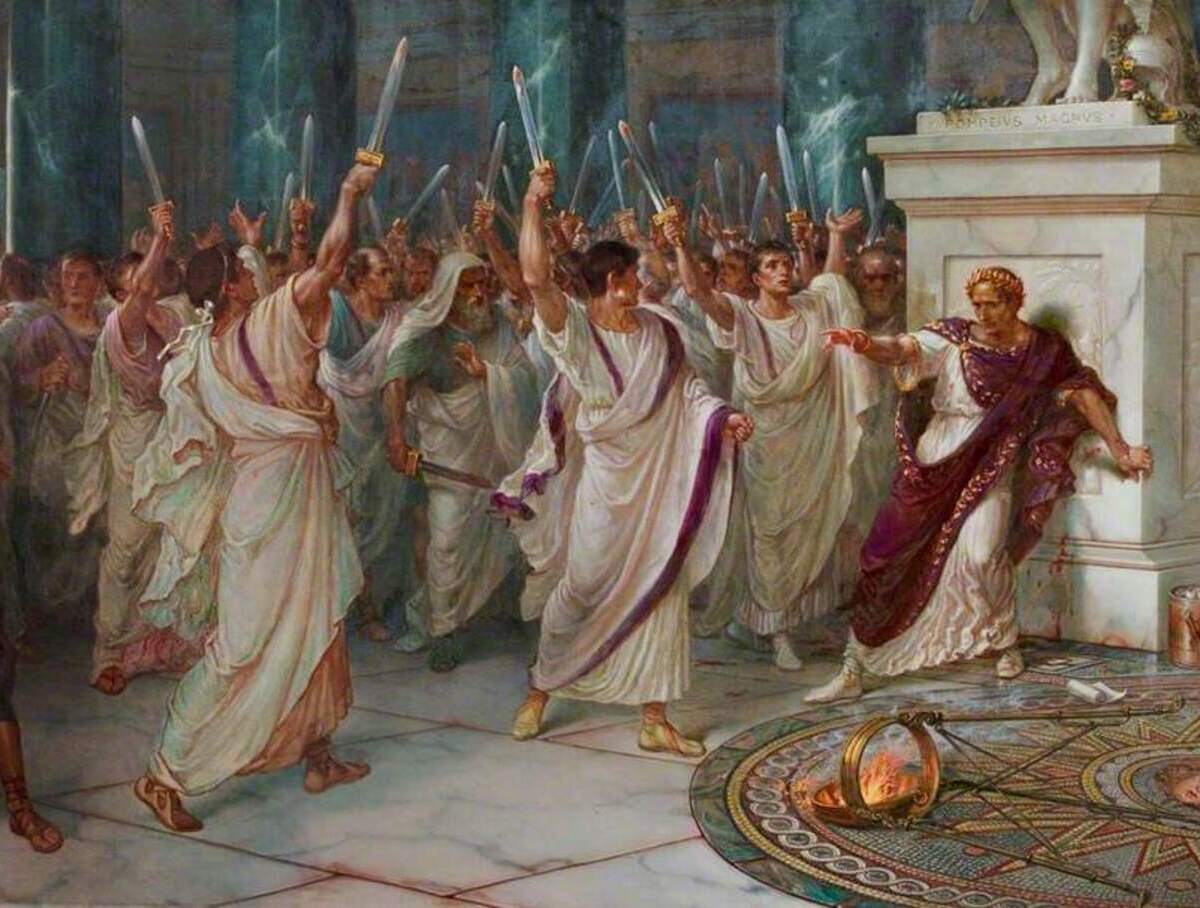The last words attributed to the Roman ruler are one of the most common ancient quotes. We decided to check whether Caesar really said this phrase before his death.
The phrase “And you, Brutus!” found both in everyday speech and in literature as a reproach for betrayal. It is believed that this is how Gaius Julius Caesar addressed his pupil, who became one of his murderers. There are many references to this phrase in Russian literature. For example, it is found in Goncharov’s novel “Oblomov"("And you, Brutus, are against me! - he said with a sigh, starting to read the books") and Marina Tsvetaeva in "Stories about Sonechka"("And you, Brutus?", in which I hear not reproach, but regret, but condescension: as if Brutus is lying, and Caesar is bending over him..."). IN "Golden calf“Ilf and Petrov play out the last minutes of Caesar’s life as part of a scene in a madhouse: “Another wrapped himself in a blanket and began shouting: “And you, Brutus, sold yourself to the Bolsheviks!”
In 44 BC. e. In Rome, a conspiracy was formed against Gaius Julius Caesar, the consul who received unlimited power. A group of supporters of the republic, led by Gaius Cassius Longinus and Marcus Junius Brutus, decided to kill the dictator. At a meeting of the Senate, the conspirators attacked him and inflicted a total of 23 blows on him with daggers.
The biography of Caesar was described in most detail many years, or even centuries, after his death. Nevertheless, this is the most reliable information that exists: it is based on the stories of the Roman ruler’s contemporaries and on the now lost works of other historians.
Lived in the second half of the 1st - beginning of the 2nd century AD. e. Plutarch in "Comparative biographies” describes Caesar’s last moments rather sparingly: “Some writers say that, fighting off the conspirators, Caesar rushed about and screamed, but when he saw Brutus with a drawn sword, he threw a toga over his head and exposed himself to blows.”
Plutarch's contemporary Gaius Suetonius Tranquillus (about 70 AD - after 122 AD). V "Lives of the Twelve Caesars“Added some details: “When he saw that naked daggers were pointed at him from all sides, he threw a toga over his head and with his left hand unraveled its folds below his knees in order to more decently fall covered to his heels; and so he was struck by twenty-three blows, only at the first he let out not even a scream, but a groan, although some report that he said to Marcus Brutus who rushed at him: “And you, my child!” In the original Suetonius gives this phrase in Greek: “καὶ σὺ τέκνον.”
Suetonius is recounted almost verbatim by Dio Cassius (155–230) in “Roman history": "Then they attacked him from many sides at once and wounded him mortally, so that, due to their number, Caesar could neither say nor do anything, but only covered his face and died from many wounds. This is the truest story, although some add that to Brutus, who struck him, he said: “And you, my child?”
In other words, the main version presented by Suetonius and after him by Dio Cassius is that Caesar died in silence. And the additional one (“some report”) is that he addressed Brutus, but not by name, but as a son. This is an important detail, since some historians (for example, Appian, who lived in the 2nd century, and the same Plutarch) wrotethat Brutus was the illegitimate son of Caesar. And to this tragic episode was added the motive of parricide. However, modern researchers think Caesar's paternity is a fiction.
The phrase “And you, Brutus!” best known for William Shakespeare's tragedy Julius Caesar (1599). In the third act it is last words Roman ruler before his death: “Et tu, Brute! Then fall, Caesar" (“And you, O Brutus! So fall, Caesar!” - translation Mikhail Zenkevich). Shakespeare Researchers think, that the phrase itself appeared a little earlier - in the play Caesar Interfectus (“Murdered Caesar”) written in Latin, staged at Oxford in 1582. Before this, no traces of the phrase in the form in which it has reached our time could be found.
Thus, ancient authors believe that Caesar either died in silence or turned to Brutus with the words “And you, my child!” The phrase "And thou, Brutus!" most likely originated in Elizabethan England and was popularized by Shakespeare.
Cover photo: The Assassination of Julius Caesar, William Holmes Sullivan, 1888 / Wikimedia Commons
Read on topic:
- Is it true that the term “caesarean section” is associated with the circumstances of the birth of Julius Caesar?
- Is it true that the gladiators shouted to the emperor before the fight: “Hail, Caesar! Those going to death greet you!”?
- Is it true that the Roman Emperor Caligula made his horse a senator?
If you find a spelling or grammatical error, please let us know by highlighting the error text and clicking Ctrl+Enter.






